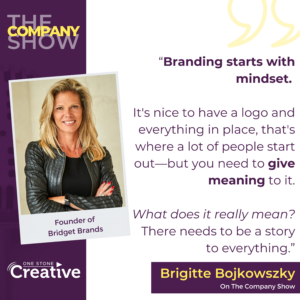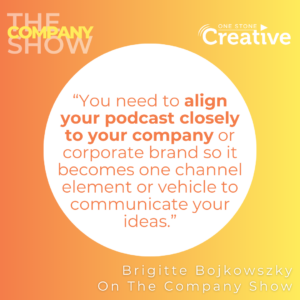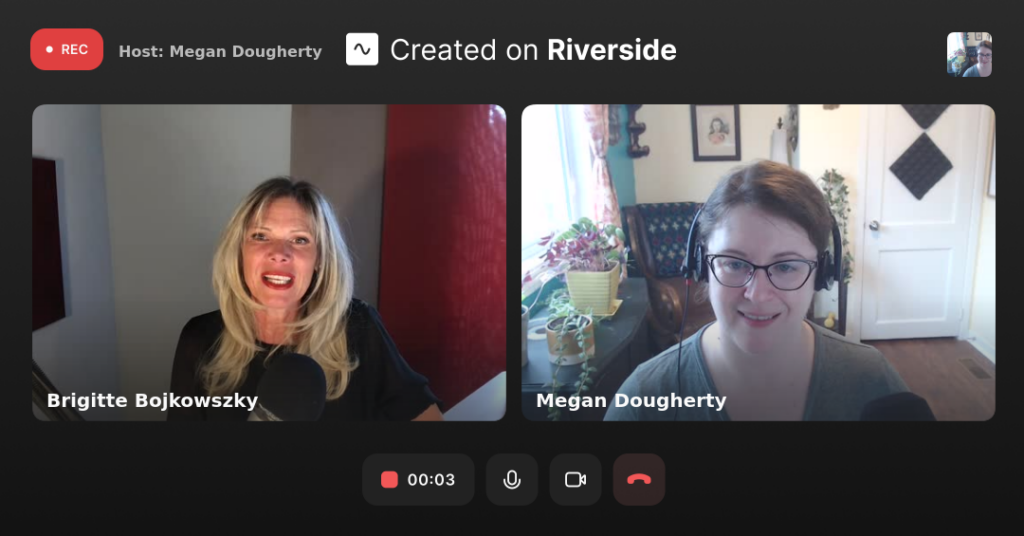Stories, Service & the Authentic YOU
“Branding is not about achieving perfection; it’s about striving for excellence.”
Are you having a hard time defining your brand?
Here’s how to navigate the intersection of personal and company branding.
In today’s digital age, the challenge of defining a brand—whether personal or corporate—can feel overwhelming. How do you distinguish between the two? When should you prioritize one over the other? If these questions resonate with you, you’re not alone.
Recently, I had the pleasure of delving into these very topics on The Company Show with the brilliant Megan Dougherty. Together, we explored the nuances of personal and corporate branding, the critical role of storytelling, the effective use of AI, and much more. Here’s a detailed look at our conversation.
💡The Intersection of Personal and Company Branding: When to Use Each
The lines between personal and company branding can often blur, but understanding when to leverage each is crucial. Personal branding is about showcasing your unique qualities, values, and expertise. It’s about building a reputation that reflects who you are as an individual. This is particularly important for entrepreneurs, executives, and anyone looking to establish a thought leadership position.
Company branding, on the other hand, focuses on the identity and values of the business as a whole. It encompasses the mission, vision, and the promise you make to your customers. For businesses it’s vital to cultivate a brand that resonates with your target audience and stands out in the marketplace.
During the podcast, we discussed how these two forms of branding intersect. Personal branding can enhance company branding by adding a human touch, making the company appear more relatable and trustworthy. Conversely, a strong company brand can bolster an individual’s personal brand by association, lending credibility and authority.
💡The Importance of Storytelling in All of Your Branding Activities
Storytelling is the backbone of effective branding. It’s not just about what you do, but why you do it. Stories create emotional connections, making your brand memorable and engaging. They convey your values, mission, and vision in a way that resonates deeply with your audience.
In our discussion, I emphasized that every brand—whether personal or corporate—needs a compelling story. For instance, my journey from a flight attendant to a corporate executive, then to an academic, and finally to an entrepreneur, is a story of transformation and self-discovery. Sharing such stories not only humanizes the brand but also inspires and connects with the audience on a personal and deeper level.
💡Efficiency and Authenticity in AI Usage
Artificial Intelligence (AI) has revolutionized the way we approach branding and content creation. Tools like ChatGPT can be incredibly efficient, helping to generate ideas, create content, and analyze data at a rapid pace. However, as powerful as AI is, it’s not without its limitations.
Accuracy and authenticity remain paramount. AI-generated content must always be reviewed for accuracy to avoid the pitfalls of misinformation. Moreover, while AI can provide the structure and efficiency needed in content creation, the human touch—our unique insights, emotions, and personal experiences—cannot be replicated. As I mentioned during the podcast,
“Perfection is a myth, but excellence is achievable.”
AI can help us achieve excellence by enhancing our capabilities, but it’s up to us to infuse authenticity and human connection into our brands.
💡Branding in Company Onboarding and Operations
Branding doesn’t stop at marketing; it extends into every facet of your business, including onboarding and operations. A well-defined brand identity should be integrated into the onboarding process to ensure that new employees understand and embody the company’s values from day one.
During our conversation, Megan and I highlighted the importance of aligning company values with personal values. This alignment fosters a cohesive culture and enhances employee engagement and commitment. When employees truly believe in the brand, they become brand ambassadors, delivering exceptional client experiences and reinforcing the brand’s promise.
💡Metrics and Indicators of Effective Branding
Measuring the effectiveness of your branding efforts is essential to ensure you’re on the right track. Metrics such as brand awareness, customer loyalty, and engagement rates provide valuable insights into how your brand is perceived. Additionally, feedback from customers and employees can offer qualitative data that highlights areas for improvement.
In the podcast, I shared my approach to tracking these metrics. Regularly reviewing and analyzing these indicators allows businesses to make informed decisions and adjust strategies as needed to maintain brand integrity and growth.
I want to extend my heartfelt thanks to Megan Dougherty for having me on The Company Show. It was such a joy to share my insights on authenticity, storytelling, and service excellence.
🔗 Tune into this episode on all major podcast platforms! Apple Podcasts, Spotify, Amazon Music, Google Podcasts, etc…
Connect with Megan Dougherty:
Websites:
- https://Podcastingforbusiness.com
- https://OneStoneCreative.net
- Podcast Episode Site on The Company Show
LinkedIn:
- Page: https://www.linkedin.com/company/onestonecreative/
- Profile: https://www.linkedin.com/in/doughertymegan/
Instagram: https://www.instagram.com/oscpodcasting/
🔸🔸🔸



